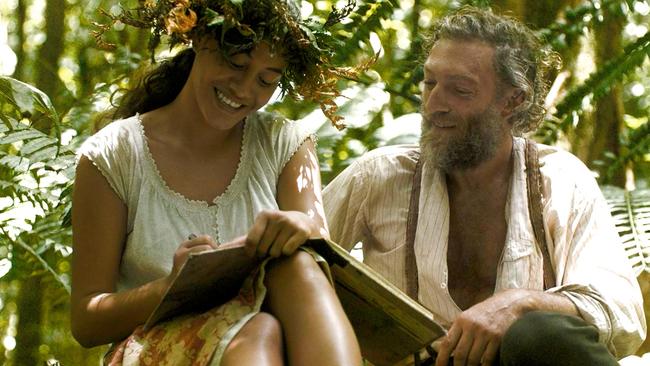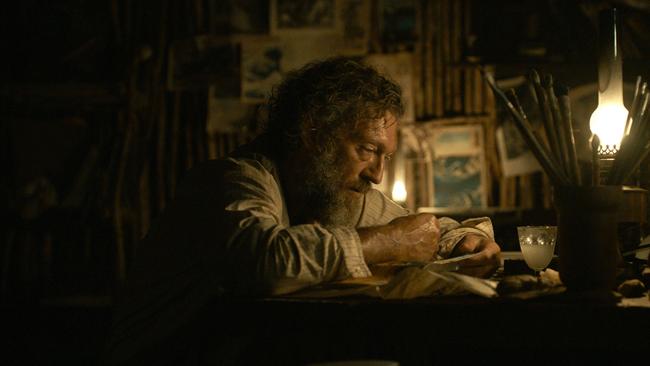Artist with something to say in Gauguin — Voyage de Tahiti
A new French film seeks to understand Paul Gauguin.

When Vincent Cassel played Paul Gauguin, he spent time contemplating the artist’s paintings. “I studied them to understand his technique: why was he so different from the others, in what sense did he revolutionise the art world at this time? It’s a good thing about being an actor that you keep on learning stuff. In that case it was painting, but it could be kung fu or being a secret agent or whatever.”
Cassel has had plenty of opportunities to learn through the years, as he often has played difficult, unpredictable, dangerous characters. His breakthrough was La Haine (1995), Mathieu Kassovitz’s explosive portrait of racism and violence. Since then, he has moved between blockbusters and independent films, and made several English-language movies.
In French-language cinema, he has played crooks, outsiders, aristocrats and abusers. He was the legendary criminal Jacques Mesrine in a two-part biopic; the charming, self-absorbed, impossible husband in Maiwenn’s My King; the epitome of sibling resentment in Xavier Dolan’s It’s Only the End of the World. He starred in a couple of films alongside his former wife, Monica Bellucci, including Irreversible, Gaspar Noe’s brutal, controversial narrative of rape and revenge.
In English-language films, he also has sought variety. He was a suave criminal in Ocean’s Twelve and Ocean’s Thirteen, a tyrannical authority figure in Black Swan and a candidate for the monarch’s hand in Elizabeth. He was a brilliant, unstable psychoanalyst and patient in David Cronenberg’s Freud-Jung drama A Dangerous Method, and in 2015 he came to Australia for Ariel Kleiman’s Partisan, giving a powerfully restrained performance as a complex father figure to a community of mothers and children in an unspecified, isolated location.

When he was young, Cassel had dance and circus training. He has always paid attention to the physical side of performance, which was why he felt obliged to pick up a paintbrush as he prepared to play Gauguin. “I’m not a good painter, I didn’t know how to draw, I’ve never been particularly gifted in that sense, but I thought that at least I should learn a bit about it so I don’t look stupid when I am doing it,” he says. “I have to be believable, that’s the whole point.
“But pretending to paint, I started to paint for real. I realised that I liked it. Then, secondly, I wasn’t as bad as I thought.” But he hasn’t continued with painting, he adds. That’s not how it works.
For Gauguin, “I bought everything: the paint, the blah blah blah, it’s all at home. I thought, ‘From now on I will paint,’ but I don’t. It’s not that you have to let it go, it’s that you have to get into it, and then you just let it go without even deciding it.”
In writer-director Edouard Deluc’s film, Gauguin — Voyage de Tahiti, the artist’s frustration with France — “There is no face or landscape left to paint here” — sends him on a search for other subjects, other ways to live. The film begins in 1891 when Gauguin leaves his wife and children and goes to Tahiti. It covers the first two years of his time there and conveys the texture of his daily life, but takes liberties with biographical details about his relationships with young women.
The difference between Gauguin’s expectations and reality is at the heart of the film, Cassel says. “That’s the whole idea, the paradise that he dreamt of doesn’t exist when he gets there. It’s as tough as it gets, and even if you are in paradise you still have to eat and pay for your rent.
“He wants to be something that he can’t be, and that’s the whole drama of the movie. This guy wants to be totally integrated into that wilderness, then at some point he realises it’s not going to happen.” As a European, it’s impossible. “He’s an old man who wants to be something other than what he is.”
This narrative is not a story of triumph or success. “He wants to be recognised or respected, and he will never get this in his life. That fame, that success, that respect, is much, much later, after his death. He’s struggling just to be recognised,” Cassel says.
He does get some affirmation from a young doctor in Tahiti, played by Malik Zidi, who responds favourably to a painting. “When he says, ‘That’s beautiful,’ that’s the first time in the whole movie that someone has recognised (Gauguin’s) work and has had something positive to say about it. For me, that moment is crucial, in the sense that he’s very touched because he’s not used to that.
“Usually people are saying bad things about what he does. They say that it’s crazy and the colours don’t mean anything and nobody wants to buy it. So yeah, it’s that recognition.”
For actors, the issue of recognition resonates strongly, he says. It’s not just about ego. Without it, they cannot find work.
“To make a painting doesn’t cost anything, just a bit of paint and a brush and a canvas. You can do it by yourself, and for much less than €100. But to make a movie, even the smallest one, is already €1 million. So if people don’t believe in you, you won’t have the crew behind you. And even if you make one movie and it collapses, you won’t make another one. So recognition as an actor, as a movie actor, there’s no other way — if they don’t recognise you, nobody will call you, ever, you stay alone in your room. That’s the toughest part of being an actor.”
Gauguin’s belief in himself and in his artistic mission are what make him interesting, Cassel says.
“He’s standing alone, and even though he is on the other side of the world, with people who don’t know what paint is about, he really believes that he has something to say, that he is going to revolutionise the world, and that one day all his suffering will be paid back. To me it’s the most fascinating aspect of him.
“I wouldn’t be like that. I wouldn’t have the strength. As an actor, after the age of 40, if nothing has happened, you know that it’s over.”
Gauguin opens on May 31.



To join the conversation, please log in. Don't have an account? Register
Join the conversation, you are commenting as Logout